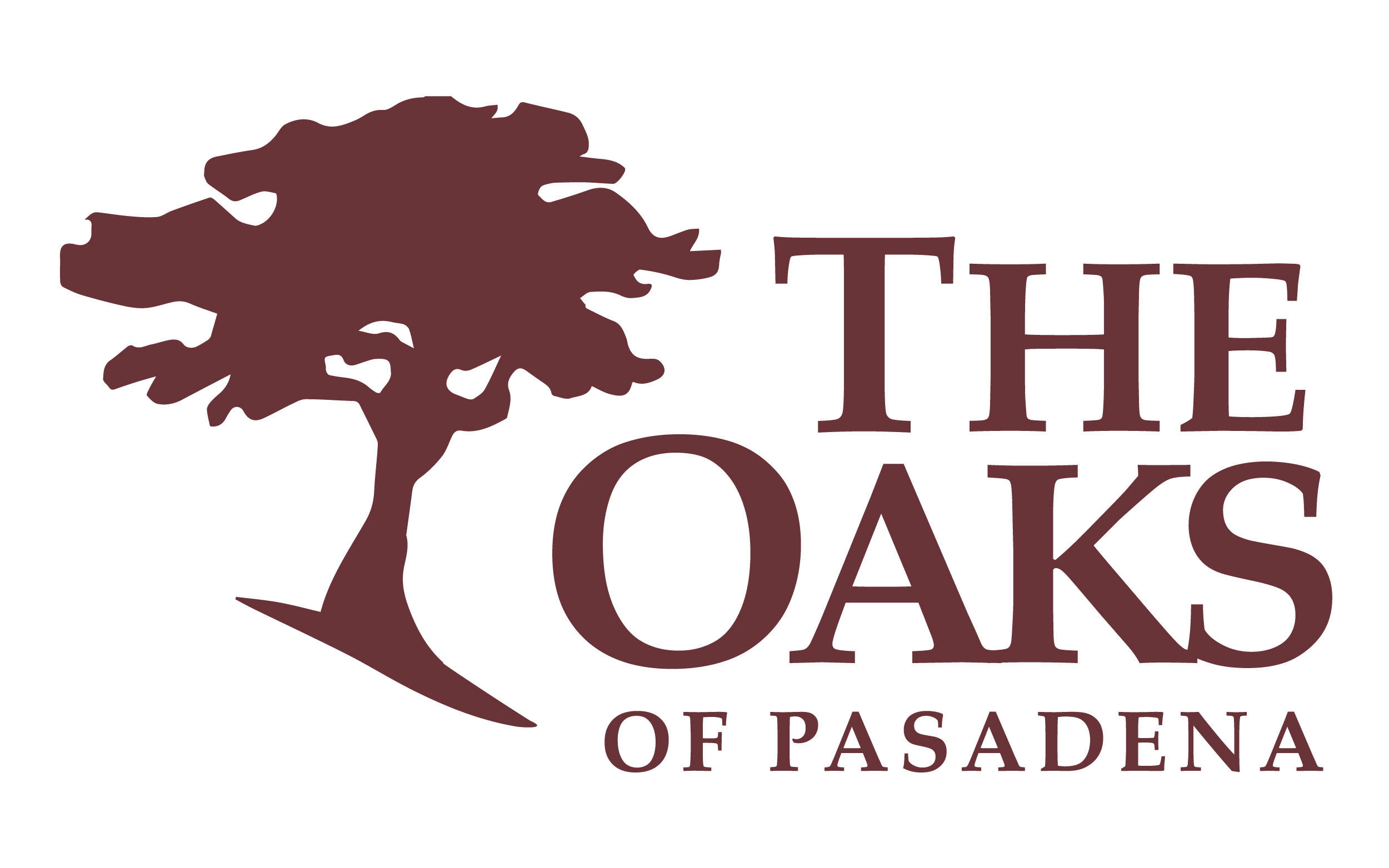Blog
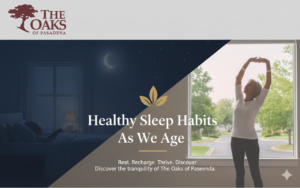
Healthy Sleep Habits As We Age Are Important
A Key to Thriving: Healthy Sleep Habits as We Age
We all know a good night’s sleep is essential for a productive day, but as we age, the quality and quantity of our sleep become even more critical to our overall health and well-being. At The Oaks of Pasadena, we understand that healthy sleep habits are a cornerstone of a vibrant, independent lifestyle.
Why Sleep Matters More as We Age
It’s a common misconception that seniors need less sleep. In reality, while sleep patterns may change, the need for restorative sleep remains. A lack of quality sleep can affect everything from memory and mood to physical health. Adequate rest helps to:
- Boost Cognitive Function: Good sleep is crucial for memory consolidation and sharp thinking.
- Improve Mood and Mental Health: It helps regulate hormones that can impact our emotional state, reducing the risk of anxiety and depression.
- Support Physical Health: Restorative sleep strengthens the immune system, helps manage chronic conditions like diabetes and heart disease, and promotes physical healing.
Your Environment is Key to a Good Night’s Sleep
Creating a peaceful environment is one of the most effective ways to improve sleep. Our residents at The Oaks of Pasadena often tell us how much they appreciate our location. Nestled in a quiet, residential neighborhood, our community is a tranquil escape from the hustle and bustle of many urban settings. The absence of city noise and traffic allows for a truly restful night—and a peaceful nap whenever you need one!
Our apartments are designed for comfort and tranquility, giving you the perfect setting to establish a healthy sleep routine. Waking up feeling refreshed and energized makes all the difference in enjoying our vibrant community at The Oaks of Pasadena and the beautiful city of Pasadena.
Tips for a Restful Night
Beyond a peaceful environment, there are several habits seniors can adopt to improve their sleep quality:
-
Stick to a Schedule: Try to go to bed and wake up around the same time each day. This helps regulate your body’s internal clock.
-
Create a Relaxing Bedtime Routine: Wind down before bed with calming activities like reading, listening to soft music, or taking a warm bath or shower.
-
Optimize Your Bedroom: Keep your bedroom dark, quiet, and cool. Consider blackout curtains, earplugs, or a white noise machine if needed.
-
Limit Naps: While occasional short naps can be refreshing, long or late-afternoon naps can interfere with nighttime sleep.
-
Watch Your Diet and Drinks: Avoid caffeine and alcohol, especially in the late afternoon and evening. A light snack before bed is fine, but heavy meals close to bedtime can cause discomfort.
-
Stay Active: Regular physical activity during the day can significantly improve sleep quality. Just be sure to finish few hours before bedtime. We offer a daily exercise group at 11 am here at The Oaks!
-
Consult Your Doctor: If you consistently struggle with sleep, talk to your doctor. He or she can help identify any underlying medical conditions or medications that might be affecting your sleep.
Reducing Stress & Anxiety in 2026: Some Tips
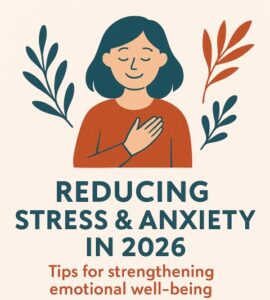
January 6, 2026
A gentle reset for the year ahead
As we step into 2026, many of us are carrying more emotional weight than we realize. The pace of life, health concerns, caregiving responsibilities, and the constant stream of information can leave anyone feeling overwhelmed. For older adults—and for the families who love them—finding calm and emotional steadiness is not just helpful, but essential.
At The Oaks of Pasadena, we believe emotional strength isn’t about “pushing through.” It’s about learning to regulate our inner world with compassion, awareness, and simple daily practices that restore balance. Below are a few practical tools and insights to help you reconnect with your inner resources and move into the new year with greater stability and hope.
🌿 1. Grounding the Mind Through Simple Daily Rituals
Small, predictable routines can create a sense of safety and structure. They don’t need to be elaborate—just consistent.
Try incorporating:
- Morning quiet time: 5 minutes of stillness, gentle breathing, or reading something uplifting.
- A daily walk: Even a short stroll helps regulate the nervous system and reduce tension. At The Oaks of Pasadena, we have a daily walking group every morning.
- A “closing ritual” at night: Soft music, dim lights, or a warm cup of tea to signal the body that it’s time to unwind.
These small anchors help calm the mind and reduce the feeling of being pulled in too many directions.
🌬️ 2. Breathing Practices to Ease Overwhelm
Breathing is one of the most effective tools for emotional regulation. It signals the body to shift out of stress mode and into a calmer state.
A simple technique to try: The 4–2–6 Breath
- Inhale for 4 seconds
- Hold for 2 seconds
- Exhale slowly for 6 seconds
Just a few rounds can help quiet racing thoughts and bring the body back into balance.
💬 3. Naming Emotions to Reduce Their Power
Sometimes the fastest way to reduce anxiety is simply to acknowledge what you’re feeling. Putting emotions into words helps the brain process them more effectively.
Try saying to yourself:
- “I’m feeling overwhelmed right now.”
- “I’m noticing some worry.”
- “This is a stressful moment, and it will pass.”
This gentle self-awareness can create space between you and the emotion, making it easier to navigate your way through the day.
🤝 4. Strengthening Connection—One Conversation at a Time
Isolation can intensify stress, while connection helps soften it. Emotional strength grows when we feel supported.
Ways to cultivate connection:
- Call a friend or family member once a week – we update our Resident Directory at The Oaks on a regular basis to help residents stay connected with fellow members of our community.
- Join a group activity or class – our monthly activities calendar includes a variety of opportunities to meet others and develop deeper connections.
- Share a meal with someone you enjoy – our restaurant-style dining room and “lunch bunch” outings make it easy to meet new friends or schedule regular meals with favorite folks.
- Ask for help when you need it—this is a sign of strength, not weakness! One of the benefits of senior communities such as The Oaks is the ready accessibility of concierge staff to help with daily frustrations and provide referrals to experts when needed.
At The Oaks, we see every day how being part of a community can lift spirits and restore hope.
🌱 5. Reconnecting With What Brings Meaning
Emotional resilience grows when we stay connected to what matters most—purpose, joy, creativity, or spirituality.
Consider exploring:
- A hobby you’ve set aside
- A volunteer opportunity
- A gratitude journal
- Time in nature
- Music, art, or reading that inspires you
These small acts nourish the inner self and help restore equilibrium.
✨ A Gentle Reminder for 2026
Emotional strength isn’t about being unshakable. It’s about learning to return to center—again and again—with compassion for yourself and others.
As we enter a new year, may you find:
- Calm in the midst of uncertainty
- Steadiness in moments of overwhelm
- Hope in the small, meaningful rhythms of daily life
From all of us at The Oaks of Pasadena, we wish you a peaceful, grounded, and emotionally resilient 2026!
The Joy and Benefits of Giving During the Holiday Season
December 2, 2025
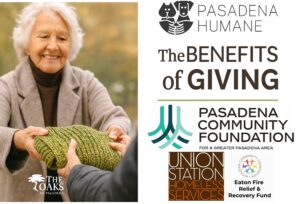 The holiday season is a time of warmth, reflection, and gratitude. It’s also the perfect opportunity to embrace the spirit of giving — not only to family and friends, but to the wider community. Whether it’s supporting a local food bank, helping children in need, or lending a hand to those experiencing homelessness, acts of generosity bring comfort to others while enriching our own lives.
The holiday season is a time of warmth, reflection, and gratitude. It’s also the perfect opportunity to embrace the spirit of giving — not only to family and friends, but to the wider community. Whether it’s supporting a local food bank, helping children in need, or lending a hand to those experiencing homelessness, acts of generosity bring comfort to others while enriching our own lives.
🌟 Why Giving Matters
Giving back offers benefits that go far beyond the immediate impact:
- Strengthens community bonds: Every act of kindness helps build a stronger, more connected neighborhood.
- Boosts personal well-being: Studies show that volunteering and charitable acts can reduce stress and increase happiness.
- Creates lasting impact: Even small gestures — a warm meal, a handmade gift, or a few hours of time — can make a meaningful difference.
🧶 Resident Stories of Giving
At The Oaks of Pasadena, we are proud to see our residents embody this spirit of generosity year-round:
- Dorothy C. shares her talents by knitting items for homeless individuals as well as newborns. Her handmade gifts provide warmth and comfort to those who need it most.
- Peggy W. dedicates her time to our local animal shelter, offering care and companionship to animals awaiting their forever homes. Her commitment brings joy not only to the animals but to the staff and community members she supports.
- Many of our residents donated non-perishable items during our annual Thanksgiving food drive for a local homeless shelter.
These examples remind us that giving doesn’t always mean writing a check — it can be sharing your skills, your time, or simply your compassion.
🌲 How You Can Give Back
Looking for ways to give this season? Consider:
- Donating non-perishable food items to a local food bank.
- Supporting charities that provide gifts for children in need.
- Volunteering at shelters or community organizations.
- Offering your talents — whether it’s knitting, baking, or mentoring — to brighten someone’s day.
💛 A Community Built on Care
At The Oaks of Pasadena, we believe that giving is at the heart of community living. Our residents inspire us daily with their generosity, and we encourage everyone to find their own way to share kindness this holiday season.
Together, we can make the holidays brighter for those around us — and discover the joy that comes from giving.
Creating a Home Inventory: A Smart Step Toward Peace of Mind
Steps Toward Creating a Home Inventory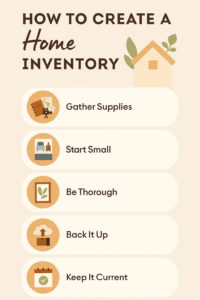
November 10, 2025
In the wake of last year’s devastating Southern California fires, thousands of residents lost not only their homes—but the cherished belongings that made those homes feel personal and meaningful. Whether you own your home or rent, creating a home inventory is one of the most important steps you can take to protect what matters most. A home inventory doesn’t just help with insurance claims—it provides clarity, comfort, and a sense of control during uncertain times.
🔍 Why a Home Inventory Matters
- Insurance Claims: A detailed inventory makes it easier to verify losses and recover value.
- Peace of Mind: Knowing your belongings are documented helps reduce stress in emergencies.
- Estate Planning: Inventories can support family conversations and future planning.
📝 How to Get Started
Creating a home inventory may sound daunting, but it’s easier than you think—especially when you take it step by step.
- Gather Your Supplies
- A notebook or spreadsheet
- Your phone for photos and videos
- Receipts or appraisals for high-value items
- Start Small
Begin with one room at a time. Start at the front of your home and work your way back. You don’t need to finish in one day—take breaks and pace yourself.
- Be Thorough
- For everyday items, clear photos are usually enough.
- For high-value items, include:
- Item name, brand, and model
- Dimensions and estimated value
- Photos or videos from multiple angles
- Notes on any existing damage
- For artwork, photograph the front, back, and any artist’s signature or maker’s mark.
- Back It Up
Save your inventory in the cloud (Google Drive, Microsoft One, Dropbox, etc.) and print a copy to store in a fireproof box. Make sure a trusted family member knows how to access it.
- Keep It Current
Update your inventory annually or whenever you make a significant purchase. It’s a living document—treat it like one.
💡 A Thoughtful Reminder
Emergencies are unpredictable, but preparation is empowering. Consider taking this simple but meaningful step toward safeguarding your home and your memories.
November Is Alzheimer’s Disease Awareness Month: Honoring Memory, Care, and Community at The Oaks of Pasadena
November 3, 2025
Each November, communities across the country come together to recognize Alzheimer’s Disease Awareness Month—a time to reflect, educate, and support those affected by Alzheimer’s and other forms of dementia. At The Oaks of Pasadena, we stand in solidarity with the millions of individuals, families, and caregivers navigating the challenges of memory loss, and we reaffirm our commitment to compassion, dignity, and connection.
🧠 Understanding Alzheimer’s Disease
Alzheimer’s is the most common form of dementia, affecting more than 7 million Americans. It gradually impairs memory, reasoning, and communication, often beginning with subtle changes like forgetfulness or confusion. Over time, these symptoms can impact daily routines, relationships, and independence.
While there is currently no cure, advances in research and care strategies continue to offer hope. New FDA-approved treatments and expanded caregiver resources are helping families manage symptoms and maintain quality of life.
💜 Supporting Caregivers and Families
November is also National Family Caregivers Month, recognizing the extraordinary dedication of those who provide daily care and emotional support. At The Oaks, we honor caregivers as essential partners in wellness and community life.
Whether it’s a spouse, adult child, or professional care provider, caregivers offer stability, comfort, and love in the face of a complex disease. Their role is deeply personal—and deeply appreciated.
🕊️ A Message of Hope
Alzheimer’s Disease Awareness Month is not only about acknowledging the challenges—it’s about celebrating resilience, advancing research, and fostering meaningful connections. At The Oaks of Pasadena, we remain committed to creating a safe, inclusive, and informed environment where every resident feels seen, supported, and valued.
Together, we honor memory. Together, we support care.
October is Mental Health Awareness Month
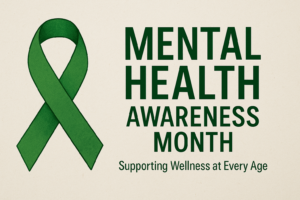
At The Oaks of Pasadena, we’re proud to support mental wellness for older adults. Join us in raising awareness, reducing stigma, and promoting healthy habits for the mind, body, and spirit. 💚 #MentalHealthAwareness #SeniorWellness OaksOfPasadena #HealthyAging #MindfulLiving #IndependentLivingCommunity
October 21, 2025
💚 Mental Health Awareness Month: Supporting Wellness at Every Age
October is World Mental Health Awareness Month—a time to reflect on the importance of emotional well-being, reduce stigma, and encourage open conversations about mental health. Throughout the month, communities across the globe come together to educate, uplift, and support those navigating challenges to their mental wellness.
At The Oaks of Pasadena, we proudly join this effort. You may see our residents and team wearing the looped green ribbon, a meaningful symbol of hope, strength, and solidarity for those affected by mental health conditions.
Why Mental Health Matters—Especially for Older Adults
The World Health Organization (2023) offers insight into why awareness is so essential:
- 🌍 By 2030, 1 in 6 people globally will be aged 60 or over.
- 🤝 Loneliness and social isolation are major risk factors for mental health challenges in later life.
- 🧠 Approximately 14% of adults aged 60 and older live with a mental disorder.
- 💔 Men aged 75 and over have the highest suicide risk of any age group.
How to Maintain Mental Health as You Age
Maintaining good mental health is about nurturing your mind, body, and social connections. Staying active, curious, and connected makes all the difference.
🧠 Stay Mentally Active
- Learn new skills: Take a class, learn a new language, or try a creative hobby like painting or writing.
- Play brain games: Work on puzzles, crosswords, or board games to keep your mind sharp.
- Read regularly: Pick up a good book or listen to audiobooks to stay engaged.
- Practice mindfulness: Try simple techniques like meditation or “box breathing” to reduce stress and improve focus.
🤝 Stay Socially Active
- Connect with others: Schedule regular conversations with friends and family, in person or by phone.
- Join community groups: Participate in clubs, volunteer groups, or faith-based activities.
- Find purpose: Engage in meaningful activities such as mentoring, volunteering, or caring for loved ones.
💪 Maintain a Healthy Lifestyle
- Exercise regularly: Walk, dance, garden, or join a group fitness class.
- Eat well: Focus on balanced, nutritious meals to fuel your body and mind.
- Prioritize sleep: Aim for 7–9 hours of restful sleep each night and maintain a consistent routine.
- Manage stress: Try relaxation techniques, spend time in nature, or talk openly with supportive people.
🌟 Additional Tips
- Challenge negative thoughts: Replace unhelpful patterns with more positive, realistic perspectives.
- Stick to routines: A daily schedule provides structure and a sense of purpose.
- Talk to your doctor: Review medications regularly and share any concerns about mood or memory changes.
At The Oaks of Pasadena
At The Oaks of Pasadena, we believe that emotional health is just as vital as physical health. Through social engagement, creative activities, educational offerings and more, our residents enjoy a vibrant lifestyle that supports overall well-being—mind, body, and spirit.
Paws-itive Living: The Joy and Profound Benefits of Pets
September 24, 2025
The joy and companionship of our beloved furry (or feathered!) friends is something many of us appreciate as we grow older. Pets are more than just animals; they are family members, confidantes, and sources of unconditional love. At The Oaks of Pasadena, we are proud to be a pet-friendly community, warmly welcoming residents and their animal companions.
It’s no secret that many of our residents share their lives with a cherished pet. From playful pups to purring cats and chirping birds, these wonderful companions bring immeasurable happiness, comfort, and even a sense of purpose to daily life.
How Pets Can Enrich Our Lives as We Age
As we age, our physical, emotional, and social needs naturally evolve. However, one fundamental need remains constant: the human desire for connection. Animals offer a unique and powerful source of companionship, comfort, and even improved health. Whether it’s the loyal devotion of a dog, the soothing purr of a cat, or the cheerful sounds of birds singing, the presence of an animal can profoundly enhance the quality of life for older adults. Seniors who spend time with animals often experience surprising benefits physically, mentally, and emotionally.
Companionship Brings Emotional Well-Being
Feelings of loneliness and isolation can be common among seniors, particularly for those who have lost a spouse, do not live near family, or have experienced a decline in their ability to be as active as they once were. Pets offer unconditional love and a constant presence that a senior can come to rely on. A dog curled up on your lap or a cat purring nearby provides immense emotional comfort. The simple interaction with a pet, whether through petting or caretaking, has been shown to reduce cortisol (the stress hormone), release endorphins, and boost serotonin, all of which help to elevate mood and reduce feelings of anxiety and depression.
Physical Health: Encouraging Movement and Routine
For physically able seniors, pet ownership naturally encourages daily activity. Gentle movements like walking a dog, playing with a cat, or even maintaining a fish tank can keep older adults engaged and moving. Studies have indicated that dog owners tend to walk more and often exhibit lower blood pressure and cholesterol levels compared to those without pets. The daily routines associated with feeding, grooming, or cleaning up after a pet provide a valuable sense of purpose and structure to the day. This consistent engagement, along with the stress reduction that pets offer, can positively impact blood pressure and heart rate.
Cognitive Benefits: Memory and Engagement
For seniors experiencing cognitive decline or memory issues, animals can be a source of gentle stimulation and even a tangible connection to the past. Petting a soft dog, listening to a bird sing, or observing fish gracefully swim can be incredibly soothing and grounding. For individuals with Alzheimer’s or dementia, interacting with pets may evoke long-forgotten memories and stimulate conversations about past pets or experiences. Animal-assisted therapy is even utilized to help seniors with dementia engage in meaningful ways, improving focus, encouraging communication, and potentially reducing agitation or confusion in some individuals.
A Reason to Get Up in the Morning
One of the more subtle, yet profoundly impactful, benefits of pet ownership in older age is the powerful sense of purpose it provides. Having another living being rely on you creates a routine and a sense of responsibility, both of which are crucial for combating depression and feelings of uselessness that can sometimes arise in later years. The daily tasks of feeding, grooming, and caring for a pet add structure to the day and cultivate a deeply satisfying feeling of being needed—something many seniors crave, especially if they’ve transitioned from previous caregiving roles or professional identities.
A Heartwarming Tale from Our Community
The profound bond between humans and animals was beautifully highlighted recently here at The Oaks of Pasadena, following the challenging time of the Eaton Canyon fire. While thankfully our community remained safe, the widespread impact on local wildlife and displaced pets was deeply felt. One of our compassionate residents, whose heart goes out to all creatures great and small, generously volunteered her time at the Pasadena Humane Society.
During her time helping out, she encountered a particularly sweet, long-haired Chihuahua who had been rescued and was in need of a loving home. This adorable dog quickly found her forever family with our resident, bringing immense joy to both. This heartwarming story is a testament to the caring spirit of our community and the profound connections that can form between people and pets. It perfectly encapsulates why we cherish the presence of animals here at The Oaks.
Not Ready for a Pet? Alternatives with the Same Joy
For some older adults, the realities of pet ownership—such as cost, mobility issues, or health concerns—may make full-time pet care unrealistic. Fortunately, there are other wonderful ways to enjoy the benefits of animal companionship without the full commitment:
- Pet Visitation Programs: Many senior living communities, like ours, partner with local animal therapy programs that bring in gentle dogs or other animals to visit.
- Volunteer at a Shelter: If physically able, spending time with animals at a local rescue or shelter can provide the same joy and sense of purpose without the long-term responsibility.
- Pet-Sitting for Friends or Neighbors: Helping care for a loved one’s pet, even for a short time, can provide wonderful social interaction and a beneficial routine.
- Adopt Low-Maintenance Pets: For those who still desire a pet but need something easier to manage, consider fish, birds, or even modern robotic pets. Robotic pets can simulate movement, purring, and responses, and have been shown to reduce stress and increase engagement in seniors with dementia.
At The Oaks of Pasadena, we are dedicated to fostering an environment where residents can thrive in every aspect of their lives, and for many, that includes the loving presence of a pet. We invite you to experience the warmth and welcoming atmosphere of our pet-friendly community. Bring your beloved companion and discover a place where both you and your pet can truly flourish!
Sip Your Way to Summer Wellness: A Reminder for Seniors
July 29, 2025
☀️ Being well-hydrated is crucial for overall health and well-being 💧
As summer heats up, so does the risk of dehydration—especially for older adults. Staying hydrated isn’t just about quenching your thirst; it’s a vital part of keeping your body, mind, and heart functioning at their best.
🧠 Why Hydration Matters More as We Age
- Less Body Water: As we age, our bodies naturally contain less water, making dehydration sneakier and more dangerous.
- Weaker Thirst Signal: Seniors may not feel thirsty until they’re already dehydrated.
- Medication Effects: Many common prescriptions can cause fluid loss or make it harder to stay hydrated.
🌡️ Signs of Dehydration to Watch For
- Dry mouth or sticky saliva
- Dizziness or headaches
- Confusion or fatigue
- Dark-colored urine or decreased urination
- Muscle cramps or rapid heartbeat
If you experience any of these, it’s time to sip—and don’t wait until you’re thirsty!
🍉 Easy Ways to Stay Hydrated
- Keep a water bottle nearby and sip regularly throughout the day.
- Eat hydrating foods like watermelon, cucumbers, celery, and oranges.
- Flavor your water with lemon, mint, or berries to make it more appealing.
- Set reminders on your phone or clock to prompt regular sipping.
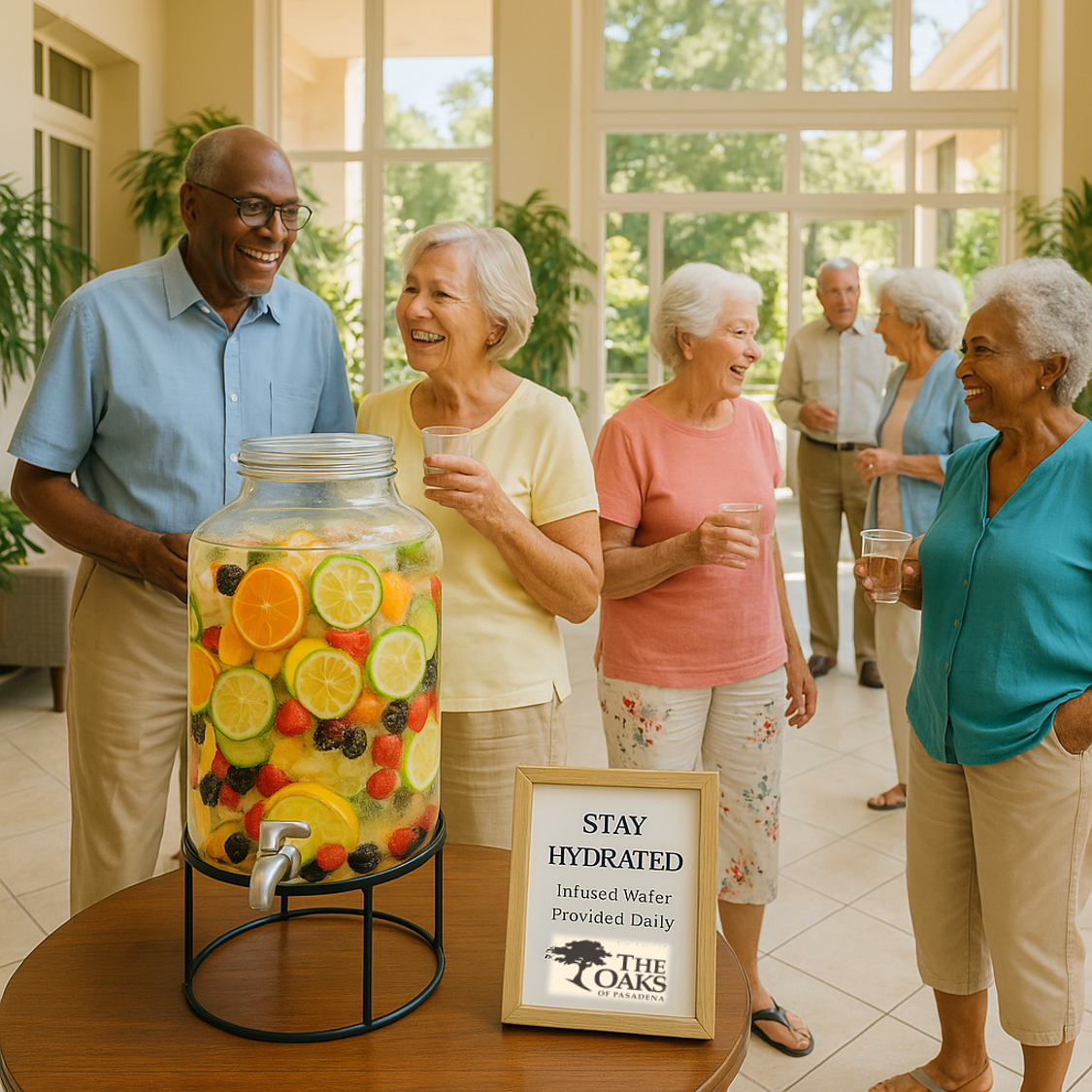
🏡 Refreshment Right at Home: The Oaks of Pasadena
At The Oaks of Pasadena, hydration is made both easy and delightful! Every day, a fresh batch of flavored water is prepared and placed in the lobby for residents, staff, and guests to enjoy. With an alternating variety of infused citrus, melon, and berries, it’s a simple but meaningful way to stay refreshed, savor summer’s best flavors, and support health—all in one sip.
👟 Hydration + Activity = Summer Success
If you’re gardening, walking, or joining any summer activities, drink water before, during, and after. Even a short stroll in the heat can drain your body more than you think.
💡 Little Sips, Big Impact
Hydration isn’t about chugging gallons of water at once—it’s the small sips you take all day long that make the difference.
So go ahead, pour yourself a glass, pop in a slice of lemon, and toast to feeling better, thinking clearer, and enjoying everything this sunny season has to offer.
Community, Connection, and Celebration
July 3, 2025
Activities Calendar
If you or a loved one are researching senior communities, make sure to get a copy of their current calendar of events. A variety of engaging activities isn’t just enjoyable—it’s essential. Social events, cultural outings, and wellness experiences create meaningful opportunities for connection, growth, and joy. These experiences nurture the body, mind, and spirit while fostering a strong sense of belonging within a senior community.
At The Oaks of Pasadena, we believe that every month should be filled with moments that inspire joy, forge friendships, and foster a deep sense of belonging. This July, our residents can look forward to a vibrant calendar of activities, all lovingly curated by our wonderful Activities Coordinator, Melany.
From a stargazing adventure at the Griffith Park Observatory to a soulful evening of Music by the Pool” with Robin & Norm, July’s events offer something special for everyone. We’re also celebrating Independence Day with a festive lunch buffet featuring summer favorites and cheerful camaraderie.

Griffith Observatory at dusk
But these events go far beyond entertainment—they’re essential to how we build connection and promote wellness at The Oaks.
Why Variety Matters
Providing a wide range of activities in senior living communities isn’t just a nice-to-have—it’s a cornerstone of a fulfilling lifestyle. Social gatherings nurture emotional wellbeing, cultural outings keep minds engaged, and physical activities support mobility and vitality. A diverse calendar empowers residents to stay curious, stay active, and stay connected—not just with their peers, but with the wider world around them.
At The Oaks, we tailor experiences to spark joy and engagement. Whether it’s enjoying live music, exploring local landmarks, or simply sharing a meal together, every moment is designed to enhance quality of life.
Come Experience the Energy
Whether you’re exploring senior independent living for yourself or a loved one, we invite you to attend one of our upcoming events and feel the warmth and energy of our community firsthand. Reach out to Steve at 626-356-2702 or email: info@pasadenaoaks.com to learn more or RSVP for an event.
Exercise and Longevity
June 24, 2025
Moving Toward Longevity: How Exercise Supports a Vibrant Life at The Oaks of Pasadena
Staying active is one of the most powerful ways to support longevity, and at The Oaks of Pasadena, many of our residents embrace movement as a key part of daily life. From daily walks to gentle chair tai chi to invigorating pool exercises, our community offers a number of options to support wellness through physical activity.
Exercise and Longevity: The Science of Staying Active
Research consistently shows that regular physical activity contributes to a longer, healthier life. Movement improves cardiovascular health, strengthens muscles and joints, enhances mental well-being, and even supports cognitive function. Those who engage in consistent exercise often experience improved mobility, reduced risk of chronic disease, and greater independence well into their later years.
Building on Movement
At The Oaks of Pasadena, residents can participate in a variety of exercise classes, including chair tai chi, yoga, stretching, and pool workouts. These sessions provide gentle yet effective ways to improve flexibility, balance, and strength.
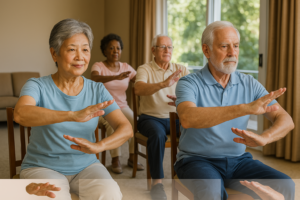
Chair tai chi exercise instruction for seniors
For those who enjoy the great outdoors, our walking group meets three to four times a week, offering a chance to enjoy fresh air while engaging in heart-healthy movement. Twice a week, residents come together for line dancing, blending rhythm, coordination, and fun to lift both body and spirit.
The Social Benefits of Staying Active
Exercise isn’t just about physical health—it strengthens social connections too. Group fitness sessions encourage camaraderie, fostering friendships through shared experiences. At The Oaks, movement is as much about community as it is about wellness, bringing residents together to support one another in their health journey.
The Path to a Longer, Healthier Life Starts Here
Longevity is about more than just adding years—it’s about making those years full of vitality, joy, and connection. With an active lifestyle and a welcoming community, The Oaks of Pasadena offers residents the opportunity to embrace movement and wellness every day.
Whether it’s a peaceful morning stretch, a lively line dance session, or a brisk walk through the neighborhood, there’s always a way to stay active—and every step supports a life well-lived
Frauds and Scams Targeting Seniors
May 19, 2025
Each year, hundreds of thousands of elderly Americans fall victim to some type of financial fraud or confidence scheme, including romance, lottery and sweepstakes scams. Scammers and fraudsters frequently target older adults, so it’s important to be aware of common schemes and how to protect oneself.

Frauds and scams alert to protect seniors
Common Scams & Frauds Targeting Elders:
- Grandparent Scams: Scammers impersonate a grandchild in distress and ask for immediate financial assistance, often via wire transfer or gift cards.
- Government Impersonation Scams: Scammers pose as government officials (IRS, Social Security, Medicare, Police or Sheriff) and demand payment or personal information, often threatening arrest or loss of benefits.
- Romance Scams: Scammers create fake online profiles, build relationships with older adults, and then ask for money or financial help for fabricated emergencies or travel.
- Tech Support Scams: Scammers claim to be from reputable tech companies and offer to “fix” nonexistent computer problems, often gaining remote access to the victim’s device and sensitive information.
- Lottery/Sweepstakes Scams: Victims are told they have won a lottery or sweepstakes but need to pay fees or taxes to claim their prize, which never materializes.
- Investment Scams: Scammers offer enticing investment opportunities with high returns and little to no risk, often involving fake cryptocurrencies or other fraudulent schemes.
- Home Repair Scams: Scammers target older homeowners, offering home repair services that are either unnecessary, poorly done, or never completed, often demanding upfront payment.
- Charity Scams: Scammers impersonate representatives of legitimate charities, asking for donations that they keep for themselves.
- Medicare/Health Insurance Scams: Scammers pose as Medicare representatives to get personal information or sell unnecessary medical equipment or services.
Identifying Potential Scams:
- Unsolicited Contact. Be wary of phone calls, emails, or door-to-door solicitations from unfamiliar individuals or companies.
- High-Pressure Sales Tactics. Scammers often create a sense of urgency, demanding immediate action and pressuring you to make a quick decision.
- Requests for Unusual Payment Methods. Scammers commonly ask for payment via wire transfer, prepaid debit cards, or gift cards, as these methods are difficult to trace.
- Requests for Personal Information. Never give out your Social Security number, bank account information, or other sensitive details to someone you don’t know or trust.
- Too-Good-to-Be-True Offers. If an investment opportunity or deal seems unbelievably good, it’s likely a scam.
Reporting Fraud:
- File a complaint with the Federal Trade Commission (FTC). Report scams and fraud online at ftc.gov/complaint or call 1-877-FTC-HELP.
- Contact your local police department. Report the incident to law enforcement as soon as possible.
- Alert your bank or financial institution. If you’ve given out financial information or sent money, notify your bank immediately.
- Report elder abuse to Adult Protective Services (APS). If you suspect elder financial abuse or exploitation, contact your local APS agency.
Tools & Resources for Elder Protection:
- Install and update antivirus software on your computer. Protect your computer and devices from malware and viruses.
- Enable caller ID and block unwanted calls on your phone or cellphone. This will reduce the risk of being contacted by scammers.
- Be careful about clicking on links or downloading attachments. Avoid opening suspicious emails or clicking on unfamiliar links.
- Use strong passwords and enable multi-factor authentication. Protect your online accounts from unauthorized access.
- Talk to a trusted family member, friend, or professional advisor. Seek advice and support from people you trust before making any financial decisions.
- Consider using a password manager and an identity theft protection service. Password managers help you keep track of passwords, and identity theft protection services can monitor your credit and personal information for suspicious activity.
By being aware of common scams, recognizing warning signs, and taking preventative measures, older adults can protect themselves from becoming victims of fraud.
Navigating Senior Living: Independent vs. Assisted Living
May 12, 2025
Understanding the difference between senior independent living and assisted living is crucial when considering moving to a senior community. Independent living is suitable for seniors who are generally healthy and self-sufficient, while assisted living provides daily support with ADLs – Activities of Daily Living (e.g., bathing, dressing, and medication management).
The distinction between senior independent living and assisted living primarily hinges on the level of care and support provided to residents. While both offer some shared or communal elements, they cater to different needs and lifestyles.
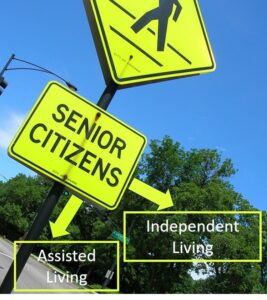
Assisted living vs independent living
Senior Independent Living (including The Oaks of Pasadena)
Often described as retirement communities or 55+ active adult communities, independent living is designed for seniors who are generally healthy, active, and capable of managing their daily lives without significant assistance. The focus is on a maintenance-free lifestyle, social engagement, and convenience.
Key characteristics of independent living include:
- Autonomy: Residents live independently in private apartments (such as The Oaks of Pasadena), condos, cottages, or houses. They manage their own schedules, personal care, and medical needs.
- Services & Amenities: These communities typically offer a range of amenities such as prepared meal options, housekeeping, laundry services, transportation, and maintenance. Social and recreational activities, fitness centers, libraries, and common areas for socializing are also typical. Although The Oaks of Pasadena does not have a fitness center, daily exercise classes are held on site.
- Healthcare: Medical care and personal assistance with Activities of Daily Living (ADLs) like bathing, dressing, or medication management are generally not provided by independent living communities. Residents can, however, hire in-home care from outside agencies if needed. The Oaks of Pasadena can refer residents to caregiver agencies that already have clients in our community.
- Resident Profile: Ideal for seniors who desire to downsize, live in a community with peers, and enjoy an active social life without the burdens and responsibilities of home maintenance. They are capable of handling their own personal care.
- Cost: Usually less expensive than assisted living as it does not include personal care services. Payment is typically private.
Assisted Living
Assisted living facilities, such as The Retreat (adjacent to The Oaks of Pasadena) are suited for seniors who require some level of personal care and support with ADLs but do not need the intensive, 24-hour medical care provided in a skilled nursing home. The aim is to provide assistance while still promoting a degree of independence.
Key characteristics of assisted living include:
- Personalized Care: Residents receive help with ADLs such as bathing, dressing, grooming, mobility, and medication management, tailored to their individual needs. Staff is available around the clock to provide assistance.
- Housing & Services: Residents typically live in private or semi-private apartments, often with kitchenettes. At The Retreat, each resident has their own bedroom. Services include daily meals served in a shared dining area, housekeeping, laundry, transportation, and social and recreational programs. Enhanced safety features are common – for example, The Retreat has alarms on all exit doors so that staff is aware if a resident goes outside.
- Healthcare Monitoring: While not providing complex medical care, assisted living facilities often have licensed nurses or nursing assistants available to monitor residents’ health, manage medications, and coordinate with outside healthcare providers. They are not, however, equipped for residents who need significant, ongoing skilled nursing care.
- Resident Profile: Suitable for seniors who need some daily support to live safely but are not bedridden and can still engage in community life. They may have some chronic health conditions that require monitoring or assistance.
- Cost: More expensive than independent living due to the care services provided. Costs normally vary based on the level of care needed. Funding can come from private pay, long-term care insurance, and in some cases, Medi-Cal. Medicare typically does not cover long-term assisted living costs.
- Regulation: California assisted living facilities are licensed and regulated by the state to ensure quality of care and safety.
In summary:
| Feature |
Senior Independent Living (such as The Oaks) |
Assisted Living (such as The Retreat) |
| Primary Focus | Lifestyle, convenience, social engagement, low maintenance | Personal care assistance, support with ADLs, healthcare monitoring |
| Level of Assistance | Minimal to none; residents are self-sufficient | Assistance with ADLs (bathing, dressing, medication, etc.) |
| Healthcare Provided | No direct medical or nursing care | Medication management, access to nursing staff (not intensive care) |
| Housing Options | Apartments, condos, cottages, houses | Private or semi-private apartments or rooms, often with safety features |
| Meals | Meal plans usually available | Typically includes three meals per day in communal dining area |
| Resident Autonomy | High degree of independence | Promotes independence with available support |
| Cost | Generally lower | Generally higher due to care services |
| Regulations | Similar to standard housing, less stringent | Stricter state regulations due to care provision |
Some senior living communities offer a continuum of care, meaning they may have independent living, assisted living, and sometimes memory care or skilled nursing facilities on the same campus. This allows residents to transition to a higher level of care if their needs change over time without having to move to an entirely new community. Caregivers can help to bridge the gap between senior independent living and assisted living settings.
Do you have questions about the difference between independent and assisting living? Contact The Oaks of Pasadena and we will be happy to discuss with you.
Phone: 626-356-2600 email: info@pasadenaoaks.com
Quiz: Do You Need Assisted Living?
May 2, 2025
Senior independent living communities such as The Oaks of Pasadena provide many amenities, but assisted living facilities provide additional personal care. Although caregivers can help bridge the gap when living at home or in an independent living community, sometimes it’s difficult to know when assisted living is the most appropriate option.
Here’s a quiz to help determine whether assisted living might be a good option in your personal situation.
*Select the answer that best describes your situation.
*At the end, add up your points to assess your level of independence.
Medication Management
How do you handle your medications?
- I organize and take them independently. (0 points)
- I need help organizing them. (1 point)
- I need reminders to take them. (2 points)
- Someone administers them for me. (3 points)
Meal Preparation
Can you prepare your own meals daily?
- Yes, I cook all my meals independently. (0 points)
- I need help with meal preparation. (1 point)
- I rely on pre-made meals or delivery services. (2 points)
- I often skip meals due to difficulty preparing them. (3 points)
Mobility
Can you move around your living space without assistance?
- Yes, I move around independently. (0 points)
- I need a walker or cane. (1 point)
- I use a wheelchair. (2 points)
- I need someone to assist me. (3 points)
Personal Hygiene & Grooming
Do you manage your hygiene and grooming independently?
- Yes, I handle all hygiene tasks myself. (0 points)
- I need occasional reminders. (1 point)
- I need physical assistance with hygiene. (2 points)
- I rely entirely on caregivers for hygiene. (3 points)
Ability to Leave Home
Can you leave your home without getting lost or confused?
- Yes, I navigate independently. (0 points)
- I need someone to accompany me. (1 point)
- I avoid leaving home due to confusion. (2 points)
- I rely on transportation services. (3 points)
Financial Management
Do you manage your finances and pay bills independently?
- Yes, I handle all financial tasks myself. (0 points)
- I need help with budgeting or paying bills. (1 point)
- I rely on someone else to manage my finances. (2 points)
- I often forget to pay bills. (3 points)
Household Chores
Do you clean your living space and do laundry independently?
- Yes, I handle all housekeeping tasks myself. (0 points)
- I need help with heavy cleaning tasks. (1 point)
- I rely on someone else for all housekeeping. (2 points)
- I struggle to keep my living space clean. (3 points)
Safety Awareness
Do you remember to turn off appliances and running water?
- Yes, I always remember. (0 points)
- I occasionally forget. (1 point)
- I frequently forget. (2 points)
- I rely on someone to check for me. (3 points)
Feeling Safe Alone
Do you feel safe living alone without supervision?
- Yes, I feel completely safe. (0 points)
- I feel unsafe at times. (1 point)
- I rely on someone to check on me. (2 points)
- I need constant supervision. (3 points)
Assistance with Daily Activities
Do you require help with dressing or eating?
- No, I manage all daily activities independently. (0 points)
- Yes, I need occasional assistance. (1 point)
- Yes, I need regular assistance. (2 points)
- Yes, I rely entirely on caregivers. (3 points)
Scoring Guide
0–7 points: You are highly independent and probably don’t need assisted living.
8–15 points: You may benefit from some assistance, such as home care services or the amenities provided at many senior independent living communities (such as The Oaks of Pasadena).
16–24 points: An assisted living facility could help support your daily needs.
25+ points: You probably require a higher level of care than independent living, such as assisted living or a memory care facility.
***
If you would like to discuss how the senior living options available at The Oaks of Pasadena might apply to your individual situation, please give us a call at 626-356-2600 or email us at: info@pasadenaoaks.com
Keeping It Simple and Refocusing During Retirement
April 10, 2025
Retirement is the perfect time to embrace a lifestyle that prioritizes ease, enjoyment, and peace of mind. Many older adults find themselves seeking ways to make daily living more convenient without compromising the activities they love. Simplifying your retirement lifestyle can open the door to new opportunities and more meaningful experiences. What are some practical tips to make life easier while keeping it vibrant and rewarding?
1. Declutter Your Space for a Fresh Start
A clutter-free home can significantly impact your quality of life. During retirement, keeping things simple and organized can save time and reduce stress. Start by tackling one room at a time, deciding which items you truly use or love. Donate, sell, or recycle anything that no longer adds value to your life.
Consider adopting a minimalist approach to your home décor. Simple layouts and fewer possessions create a calming atmosphere, making it easier to clean and maintain your living space. Decluttering not only refreshes your environment but also gives you more room to enjoy hobbies and entertain family or friends.
At The Oaks of Pasadena, our independent living apartments offer the perfect backdrop for a simplified lifestyle. With spacious layouts and plenty of storage space, you can enjoy a clutter-free environment that’s easy to maintain.
2. Embrace Technology for Everyday Convenience
Technology can streamline many aspects of your retirement lifestyle. Smartphones, tablets, and smart home devices make it easier to stay connected and manage daily tasks. For instance, setting up reminders on your phone can help you track appointments or medications, while apps like grocery delivery services save you trips to the store.
Additionally, online banking simplifies managing your finances. You can pay bills, monitor your account, or even consult with a financial advisor from the comfort of your home. Don’t hesitate to explore tech options that you haven’t tried before – many community centers even offer classes to help you get started.
At The Oaks of Pasadena, our friendly staff will help you with your cell phone and other tech tools so that you can stay connected and make the most of modern conveniences.
3. “Rightsize” to a More Manageable Home
Retirement offers an excellent opportunity to rethink your living arrangements. If maintaining a large home has become too demanding, consider rightsizing to a smaller, easier-to-manage space. A smaller home usually requires less upkeep, giving you more time to relax or explore other interests.
The Oaks of Pasadena is an ideal choice for those looking to downsize without sacrificing comfort or independence. Our independent living community offers a range of apartment options, from cozy studios to spacious one- and two-bedroom layouts. With amenities like housekeeping, local transportation, and restaurant-style dining, daily living becomes less stressful and more effortless.
4. Focus on a Healthy Routine
Simplifying your retirement lifestyle also means prioritizing your health. Maintaining a balanced routine with regular exercise, nutritious meals, and enough rest can improve your energy and overall well-being. Start small—add light stretches in the morning or go for a walk in the evening.
At The Oaks of Pasadena, we support your health goals with daily exercise classes such as yoga, Chair Tai Chi, and pool aerobics; a walking group; a swimming pool; and chef-prepared meals to nourish your body and mind.
5. Build Meaningful Connections
Social connections play a big part in simplifying your retirement lifestyle. Spending time with family, friends, and neighbors can bring a sense of joy and belonging. Make an effort to maintain relationships with those who bring positivity into your life. Regular coffee dates, phone calls, or shared hobbies can strengthen these bonds.
The Oaks of Pasadena fosters a vibrant community where residents can connect through social activities, events, and programs. From theatre and shopping outings to educational lectures, music appreciation to art classes, movie matinees to Scrabble and Bridge, there’s always an opportunity to have fun and build meaningful relationships.
6. Simplify Your Daily Schedule
Retirement often means having more free time, but an overly packed schedule can cause stress. Simplify your days by focusing on activities that bring the most happiness or relaxation. Prioritize the hobbies, outings, or projects that are most meaningful to you.
Using a planner or calendar app can help you stay organized without feeling overwhelmed. Schedule breaks or downtime to recharge, especially if your day involves several commitments. This approach allows you to balance productivity with leisure, making each day more enjoyable.
At The Oaks of Pasadena, we make it easy to enjoy a balanced lifestyle. With a variety of on-site amenities and services, you can focus on what matters most while leaving the rest to us.
7. Discover Stress-Free Living at The Oaks of Pasadena
At The Oaks of Pasadena, we believe in simplifying life for our residents. By offering a range of amenities, we create a low-stress environment where our resident can focus on enjoying what matters most. From independent living to our assisted living home (“The Retreat”), we meet your needs while providing you the opportunity to live comfortably and as independently as possible.
Daily living is definitely easier in a senior community with features like chef-prepared meals, housekeeping, and scheduled transportation. You can spend less time worrying about chores and more time exploring hobbies or socializing.
Retirement is the perfect time to embrace simplicity and focus on the things that truly matter. With thoughtful planning, meaningful connections, and a supportive community like The Oaks of Pasadena, you can live with less stress and more joy.
Ready to learn more about how we can help? Contact The Oaks of Pasadena today to schedule a visit and discover all the ways we can simplify your retirement lifestyle!
Phone: 626-356-2600 email: info@pasadenaoaks.com
Art, Art, Art!
April 4, 2025
Art classes offer a wealth of benefits for everyone, but why offer them in a senior community such as The Oaks of Pasadena? Some of the benefits include: fostering creativity, cognitive function, and social engagement, all of which enhance quality of life and promote healthy aging. By engaging in artistic activities, we can can tap into our inner potential and maintain mental sharpness—all while experiencing the joy of creation and sharing with others.
At The Oaks of Pasadena, we’re thrilled to offer both hands-on art classes and Art Appreciation classes as part of our monthly calendar of events. This quarter, our Art Appreciation series features “History of European Art”, presented with special thanks to Pasadena City College for their support. Meanwhile, our hands-on art classes include an upcoming painting class on April 17th, offering participants the chance to express themselves creatively while learning new skills.
Art classes stimulate cognitive function through activities like painting, drawing, and sculpting, which require planning, decision-making, and problem-solving to keep the mind active and sharp. Engaging in art enhances neural connectivity, forming a ‘cognitive reserve’ that supports memory and problem-solving. Additionally, exploring various artistic mediums boosts self-esteem and a sense of accomplishment.
Beyond mental stimulation, art programs foster social interaction and community engagement. Participating in group sessions connects like-minded individuals, encouraging friendships and combating loneliness. These connections form a strong sense of belonging, which is integral to overall well-being and helps make The Oaks of Pasadena a true senior community.
Art also serves as a powerful tool for emotional expression and self-discovery. For older adults who may find it challenging to articulate their emotions verbally, art provides a nonverbal outlet to process and express feelings in a safe, supportive environment. Through both creation and appreciation, participants can explore their inner worlds, uncover new perspectives, and find renewed purpose in life.
Overall, the variety of art programs at The Oaks of Pasadena—including hands-on art classes like our April 17th painting session and the “History of European Art” series—offer a holistic approach to well-being for our residents. By encouraging creativity, fostering social bonds, and promoting emotional and intellectual growth, these programs play a vital role in helping us all age gracefully while maintaining an enriched quality of life.
By the way, if you or a loved one are considering moving to a senior community, we invite you to participate in one of our classes or activities. Give us a call at 626-356-2702 or email us at: info@pasadenaoaks.com
Cracking the Code: Senior Living Myths Busted (By Someone Who’s Been There!)
March 13, 2025
Alright, folks, gather ’round. If you’re anything like I was a few years back, the phrase “senior living community” probably conjures up images of bingo halls, bland food, and… well, the end of fun. I couldn’t have been more wrong.
I’m Mary, and I moved to The Oaks of Pasadena a few years ago. Let me tell you, it’s been the best decision I’ve made in ages. But before I took the plunge, I was bombarded with all sorts of myths!
Myth #1: Senior communities are just waiting rooms for the inevitable.
Reality: Oh, please! The Oaks of Pasadena is buzzing with life. We have yoga classes, a walking group, art classes and activities, a book club, daily exercise classes, live music events, and even poker games which get pretty competitive. I’ve taken up volunteering at Pasadena Humane and helping to organize outings to Sierra Madre Playhouse. It’s not about waiting; it’s about living. It’s about having the time and resources to do the things you love, without the burdens of home maintenance.
Myth #2: You lose your independence.
Reality: This one had me worried. But the truth is, I’ve gained more independence. I don’t have to worry about mowing the lawn, fixing a leaky faucet, or driving in bad weather. Transportation is provided for shopping and appointments, anywhere local you want to go really, and help from the staff is available if I need it, but I’m still running my own show. I have my own apartment, my own schedule, and my own friends. I’m more independent now than when I was struggling to keep up with my big old house.
Myth #3: The food is terrible.
Reality: The chefs here, Alex and Chino and Nacho, could give any fancy restaurant a run for its money. We have a varied menu with delicious, healthy options. Lots of seafood choices, which I love. It’s far better than the microwave and fast food meals I was relying on before!
Myth #4: You’ll be surrounded by people you have nothing in common with.
Reality: I was worried about this, too. But the truth is, everyone here has a story. We’re all from different backgrounds, but we share a common stage of life. Most of us have lived in the Pasadena area for many years, but others moved here to be closer to family members. I’ve made some wonderful friends, and we have the best conversations. We laugh, we share, and we support each other. It’s like having a whole new extended family.
Myth #5: It’s too expensive.
Reality: Yes, The Oaks is more expensive than a regular apartment, but when you factor in the costs of homeownership – property taxes, maintenance, utilities, insurance – plus the added benefits of meals, activities, housekeeping and transportation, it’s much more affordable than I thought. And the peace of mind? Priceless.
Myth #6: You’ll be isolated from your family.
Reality: My kids and grandkids visit more often now! They love coming here for dinner, using the pool, and we have plenty of space to hang out together. They also love that they don’t have to worry about me being alone or struggling at home.
The Bottom Line:
Moving to a senior independent living community isn’t about giving up; it’s about embracing a new chapter. It’s about simplifying your life and focusing on what matters. It’s about finding friends and support, and rediscovering your passions.
If you’re considering a move, I encourage you to do your research. Visit a few communities, talk to the residents, and ask questions. Don’t let the myths hold you back from a fulfilling and joyful life.
And who knows? Maybe I’ll see you taking a tour attending one of the Open House events here at The Oaks of Pasadena!
Music Appreciation – A Lifetime of Listening Has Benefits
March 10, 2025
“Music Appreciation” is one of the best-attended activities at The Oaks of Pasadena. Many thanks to Pasadena City College and our guest lecturer Ryan!
Listening to and discussing music stimulates the brain, enhancing memory and cognitive functions. It can also help in preserving cognitive abilities over time. Music appreciation topics typically include:
Music Theory Basics: Understanding the fundamentals of music, including notes, scales, chords, and rhythm.
History of Music: Exploring different musical periods, such as Baroque, Classical, Romantic, and Modern.
Famous Composers and Musicians: Studying the lives and works of significant composers and performers.
World Music: An overview of musical traditions from various cultures around the world.
Genres and Styles: Identifying and appreciating different genres, such as classical, jazz, blues, rock, and pop.
Musical Instruments: Learning about the different types of instruments and their roles in music.
Listening Skills: Developing critical listening skills to analyze and appreciate various musical elements.
Music and Technology: Understanding the impact of technology on music creation and distribution.
What are the various mental, social, and emotional benefits to be gained with music appreciation?
1. Cognitive Engagement. Listening to, analyzing, and learning about different types of music can stimulate the brain, helping maintain cognitive health. Music can activate areas of the brain associated with memory, language, and emotions, which is particularly helpful for our independent living residents at The Oaks of Pasadena who are aiming to stay mentally sharp.
2. Emotional Well-being. Music’s therapeutic qualities can help individuals of all ages manage stress, elevate mood, and foster emotional resilience. Listening to or discussing music from earlier periods in life often brings back positive memories for Oaks of Pasadena residents and guests, creating a strong sense of comfort and joy.
3. Social Interaction. Music appreciation classes or groups provide social opportunities, helping reduce feelings of loneliness and isolation. By gathering with others who share similar interests, older adults can build friendships, stay socially engaged, and feel a greater sense of community. Our weekly classes at The Oaks of Pasadena always draw a large crowd!
4. Cultural Enrichment. Learning about music’s history, styles, and elements offers residents at The Oaks of Pasadena a deeper understanding of the arts and culture, enriching their daily lives and enhancing their appreciation for different genres and time periods.
We welcome family members, potential residents and friends to sit in on one of our classes. Call 626-356-2702 or email: info@pasadenaoaks.com
Reverse Mentoring in a Senior Community – Take Our Quiz!
February 26, 2025
Traditional mentorship typically flows from older to younger individuals. However, today’s dynamic and multi-generational living and working environments have given rise to “reverse mentoring” – a powerful tool for cross-generational learning and growth. Test your understanding of this modern approach to personal development which can take place in many settings, including senior independent living communities such as The Oaks of Pasadena.
Choose the best answer for each question.
1. Which of the following is an example of reverse mentoring in a senior independent living community?
A. An experienced resident coaching a new resident about the rules of the community
B. A younger staff member sharing their expertise about using the internet with an older resident
C. Peer-to-peer mentoring between residents of the same age group
D. A formal safety training program led by community staff
Correct Answer: B
Explanation: Reverse mentoring flips the traditional mentorship model, allowing younger individuals to share their unique perspectives and skills – particularly in areas like digital technology and new hobbies – with older individuals.
2. When establishing a reverse mentoring relationship, what’s the crucial first step?
A. Create a formal contract
B. Set a fixed meeting schedule
C. Identify specific learning objectives
D. Determine the mentorship duration
Correct Answer: C
Explanation: Success in reverse mentoring begins with clearly defining what you want to learn. Having specific objectives helps match you with the right mentor and ensures productive sessions.
3. What’s the most effective way to initiate a reverse mentoring relationship?
A. Send a casual social media message
B. Have community staff make the connection
C. Be open about your learning goals and interests
D. Wait for someone to approach you
Correct Answer: C
Explanation: Direct communication about your learning goals and what you hope to gain creates a foundation of trust and sets clear expectations for both parties.
4. How should participants approach the reverse mentoring process?
A. Follow a rigid agenda
B. Maintain strict professional boundaries
C. Be open to organic discussions and learning opportunities
D. Focus solely on technical skills
Correct Answer: C
Explanation: While structure is important, allowing conversations to flow naturally can lead to unexpected insights and deeper learning for both parties.
5. What characterizes a successful reverse mentoring relationship?
A. The mentor doing all the teaching
B. Focusing only on technology skills
C. Mutual learning and knowledge exchange
D. Following a standardized curriculum
Correct Answer: C
Explanation: The best reverse mentoring relationships benefit both parties, with each person contributing their unique knowledge and perspective while learning from the other.
6. What’s a common challenge in reverse mentoring that participants need to address?
A. Bridging generational perspectives
B. Limited activity hours
C. Geographic distance within the community
D. Language barriers
Correct Answer: A
Explanation: Different generational viewpoints can create initial challenges, but working through these differences often leads to valuable insights and stronger community relationships.
7. Which statement about younger mentors is accurate?
A. They only understand new technology
B. They lack sufficient experience to mentor
C. They bring valuable contemporary insights
D. They prefer formal teaching methods
Correct Answer: C
Explanation: Younger mentors often bring fresh perspectives, current knowledge, and innovative approaches that can benefit more experienced residents.
8. Why is maintaining humility essential in reverse mentoring?
A. To maintain traditional hierarchy
B. To foster mutual respect and learning
C. To avoid conflicts within the community
D. To meet community guidelines
Correct Answer: B
Explanation: When both parties remain humble and curious, it creates an environment where genuine learning can occur, regardless of age or experience level.
In summary: Effective reverse mentoring breaks down generational barriers and creates opportunities for mutual growth and learning in many settings, including senior independent living communities such as The Oaks of Pasadena.
Eaton Canyon Fire Relief & Recovery Efforts
February 12, 2025
The Pasadena Community Foundation (PCF) opened the Eaton Canyon Fire Relief and Recovery Fund to provide an opportunity for those who want to support immediate and pressing needs in the aftermath of the devastating Eaton Fire. As of February 11, 2025, PCF has raised $13 million, but they will need much more to address the needs of our local community now and in the following months and years.
Residents and staff at The Oaks of Pasadena have been donating to PCF and other relief organizations, in addition to welcoming new residents to our community who lost their homes in the fire.
To donate to PCF: https://lnkd.in/gyqEAU8T.
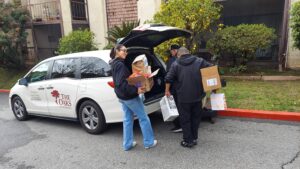
Loading donations from The Oaks of Pasadena for Eaton Fire victims.
The Benefits of Practicing Mindfulness
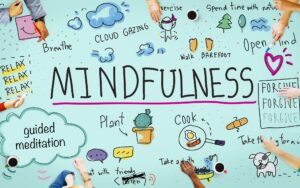
Mindfulness is a useful tool
Mindfulness, the practice of being present and fully engaged with the here and now, has become a popular tool for enhancing mental and physical well-being. Although it benefits people of all ages, mindfulness is particularly valuable for seniors and adults who seek to stay present, connected, and engaged with life. The benefits of mindfulness are numerous, ranging from improved mental health to better physical health and stronger social connections.
1. Enhances Mental Health
Mindfulness practice can significantly enhance mental health by reducing stress, anxiety, and depression. For seniors and adults, these mental health issues can often be exacerbated by life’s challenges, such as health concerns, loneliness, or the loss of loved ones. By focusing on the present moment and cultivating a non-judgmental awareness of thoughts and feelings, mindfulness helps individuals break the cycle of negative thinking and find peace and clarity.
Moreover, mindfulness has been shown to improve cognitive function. Studies suggest that regular mindfulness practice can enhance memory, attention, and decision-making skills. For seniors, this is particularly important as it can help slow the cognitive decline associated with aging and maintain mental sharpness.
2. Improves Physical Health
The physical benefits of mindfulness are equally impressive. Practicing mindfulness can help lower blood pressure, reduce chronic pain, and improve sleep quality. For seniors and adults with health conditions such as hypertension, arthritis, or insomnia, mindfulness can offer a natural and effective way to manage symptoms and improve overall well-being.
Additionally, mindfulness encourages individuals to adopt healthier lifestyle habits. By fostering a greater awareness of the body’s needs and sensations, mindfulness can help people make better choices regarding diet, exercise, and self-care. This can lead to improved physical health and increased energy levels.
3. Strengthens Social Connections
Social connections are crucial for emotional well-being, especially for seniors who may face social isolation. Mindfulness can help strengthen social connections by promoting empathy, active listening, and compassionate communication. By being fully present in interactions with others, individuals can build deeper and more meaningful relationships.
Mindfulness also encourages a sense of community and belonging. Many mindfulness practices, such as group meditation sessions or mindfulness-based stress reduction (MBSR) programs, provide opportunities for social engagement and support. This can help seniors and adults feel more connected and less isolated.
4. Enhances Emotional Resilience
Emotional resilience is the ability to adapt to and recover from life’s challenges and adversities. Mindfulness practice can enhance emotional resilience by fostering a greater awareness of emotions and developing healthy coping strategies. By observing emotions without judgment and responding to them with compassion, individuals can navigate difficult situations with greater ease and maintain a positive outlook on life.
For seniors, who may face unique challenges such as health issues or loss, emotional resilience is particularly important. Mindfulness can help them build the strength and adaptability needed to face these challenges and continue to find joy and meaning in life.
The Oaks of Pasadena: Supporting Seniors with Mindfulness
At The Oaks of Pasadena, seniors have access to a variety of yoga and daily exercise groups that promote mindfulness and overall well-being. These programs are designed to cater to the unique needs of seniors, helping them stay physically active, mentally sharp, and socially connected.
Yoga for Mindfulness
Yoga is a powerful practice that combines physical postures, breathing exercises, and meditation to promote mindfulness and relaxation. At The Oaks of Pasadena, seniors can participate in gentle yoga classes that focus on improving flexibility, balance, and mental clarity. These classes provide a safe and supportive environment for seniors to explore mindfulness through movement and breath.
Daily Exercise Activities
In addition to yoga, The Oaks of Pasadena offers daily exercise classes that incorporate mindfulness techniques into physical activities. These provide seniors with opportunities to engage in low-impact exercises, such as stretching, tai chi, and water exercises, while also practicing mindfulness. By combining physical activity with mindfulness, seniors can experience the dual benefits of improved physical health and mental well-being.
Conclusion
In summary, mindfulness offers a wide range of benefits for seniors and adults who want to stay present and engaged with life. By enhancing mental and physical health, strengthening social connections, and promoting emotional resilience, mindfulness can help individuals lead happier, healthier, and more fulfilling lives. Whether you’re new to mindfulness or have been practicing for years, incorporating mindfulness into your daily routine can be a powerful tool for maintaining well-being and staying connected to the present moment. So why not give it a try? Your mind, body, and spirit will thank you.
If you are considering moving to senior independent living community such as The Oaks, we invite you to participate in one of our yoga or other daily exercise classes. It’s a great way to get a feel for our community and do something good for your health! Call us at 626-356-2600 or email us at info@pasadenaoaks.com to sign up for a class.
